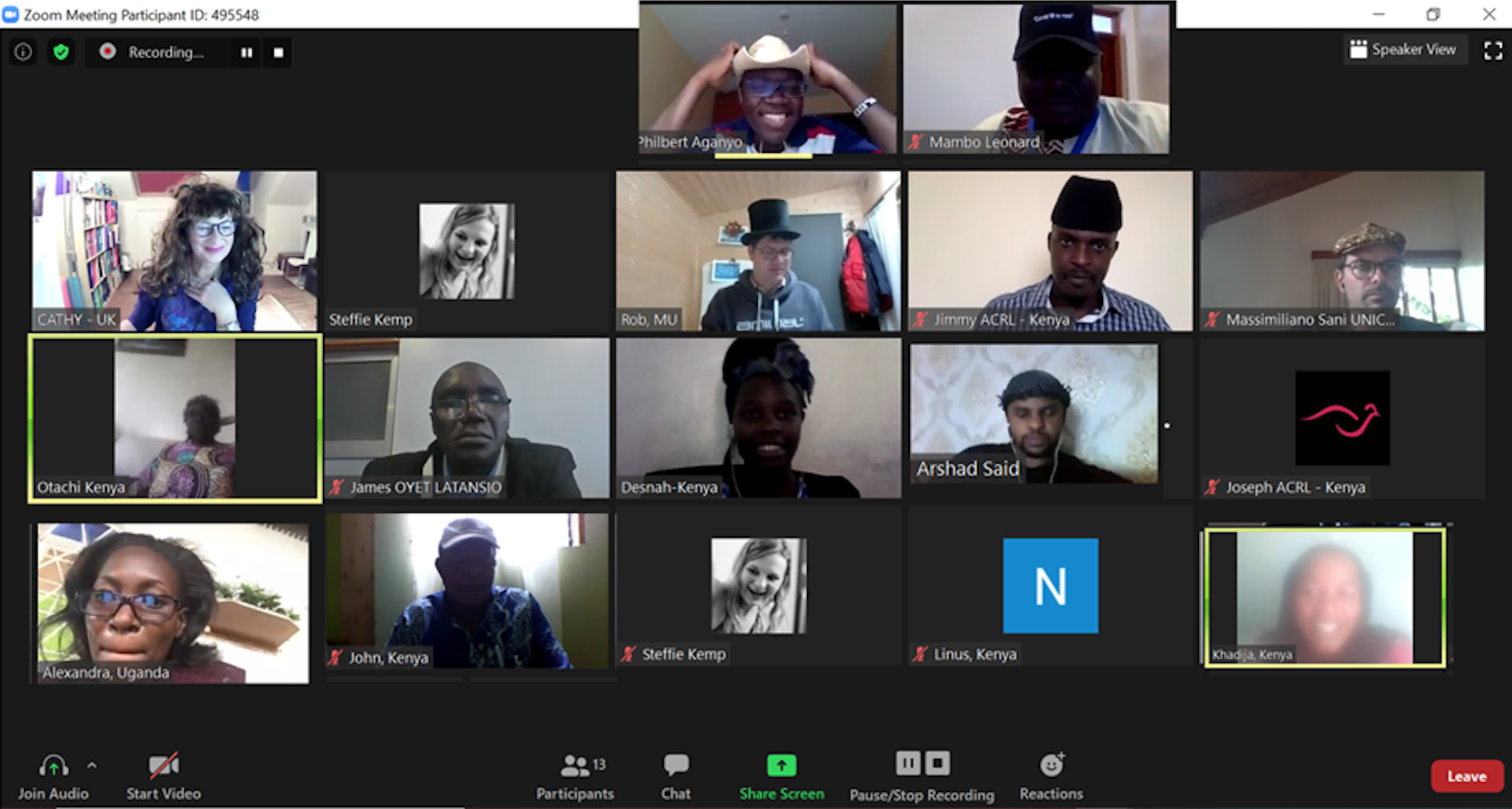FPCC Launches First Virtual ‘Mind & Heart Dialogue Training’ Series to Support Faith Leaders During COVID-19 in Eastern and Southern Africa
20201205In response to the ‘Info-demic’ and other social challenges posed by the COVID-19 pandemic, the Faith and Positive Change for Children, Families and Communities (FPCC) hosted its first of six COVID-19 training webinars for religious leaders and faith-based organizations (FBOs) in Eastern and Southern Africa Region (ESAR) on 10 and 11 November, 2020. Spaced over two months, the webinar series aims to equip multi-faith actors to address harmful myths and rumors, counteract stigma and discrimination and violence against children, and strengthen partnerships with each other and UNICEF to improve the wellbeing of children, families and communities.
“This is unlike any other training coordinated by RfP,” said Jimmy Otieno, one of the facilitators from ACRL.“It is a space where we are modelling how to facilitate Mind and Heart Dialogue which incorporates the FPCC foundational approach of reflections from the heart, combining the technical with the spiritual and emotional, and working this out in relation to children, in our own journey and with those around us. Faith teachings are very influential in this process.”
UNICEF, Religions for Peace, and Joint Learning Initiative on Faith & Local Communities (JLI) launched FPCC in 2018 to empower multi-religious leaders to go beyond “business as usual” in promoting positive social and behavioral change with and for children. In April 2020, FPCC shifted its focus to support faith actors in alleviating the pandemic’s impact on children through the #FaithInAction COVID-19 Initiative. ACRL-RfP convened the first webinar together with the UNICEF Eastern and Southern Africa Regional Office (ESARO) and co-facilitated by JLI.
In the first session of the webinar series, 33 participants reflected on how misinformation affects various members of society and especially the most vulnerable. In a virtual power walk exercise to raise greater awareness of how power and vulnerability impact the community, one participant from the Interreligious Council of Kenya, put herself in the shoes of a subsistence farmer:
“We hear so many facts, we don’t know which ones are right … Since I can’t read the only avenue I have is the radio, but the way COVID messaging is put, it’s in English or Swahili. Until content is provided to me in my local language, I can’t fully understand so I can’t share the information with my family to understand the real facts about the virus so I have to rely on the informal stories I hear in my community,” Rebecca said.
Religious leaders also examined a list of common COVID-related rumors, eg. “Prayer will save me from COVID-19; so I don’t need to follow health guidelines” and forms of discrimination eg. If a girl becomes pregnant during lockdown, she must be at fault and responded whether they believed the statements were true or false. The fact that one participant wrote “60% true” in relation to the myth, “God sent the Coronavirus to punish us for our sin” sparked a lively debate amongst religious leaders participating. The activity also prompted religious leaders to share additional myths circulating in communities, to reflect on their own assumptions and to explore how they could use scriptural teachings to reinforce scientific information, building on FPCC’s Faith Community Guidance Documents. Participant sharing during the webinar also helped to expand the training resource document on common COVID-related myths, rumours and stigma to be used in subsequent webinars at the country level.
In a final exercise, participants of the inter-faith training were asked to consider how to conduct a mapping of those members of their communities who were most vulnerable to stigma and discrimination and those who could be mobilized to counteract harmful misinformation and stigmatization.
“Children follow whatever adults are doing, but now adults are not practicing safe measures … We must change and show them that COVID-19 is still out there,” Tendai, a religious youth leader from the Interreligious Council of Zimbabwe, told the group. “As faith leaders, we need to … reach out to others who are influential. We need a multi-sectoral approach, both within and outside the church.”
Massimiliano Sani, Communication for Development (C4D) specialist in the UNICEF Eastern and Southern Africa Regional Office expressed hopefulness in the webinar series, “the first webinar was a true reflection of what we hope religious colleagues will take back to their country-level work in order to influence dialogue, reflection, change within their communities.”
According to Kerida McDonald, Senior Advisor in the C4D Section in NYHQ, plans are already underway to organize a similar webinar series with ACRL in West and Central Africa with the aim of building skills of religious leaders in other regions to lead social and behaviour change efforts and to strengthen existing inter-faith coordination mechanisms at country level to facilitate joint planning and multi-religious action for children in collaboration with UNICEF country offices and partners.
In closing the first FPCC COVID-19 session Otieno left participants with a passionate plea, “Everywhere around us there are vulnerable people and groups. As faith leaders, we need to think about managing people, not just managing the pandemic or infodemic. Let’s call on leaders within our Faith communities to gather technical/ scientific evidence and consider how we can connect at an individual, family, and community level and be aware of children’s voices: who is listening to the children and youth? Let us help to make sure their voices are being echoed and responded to in the policies and programmes intended to serve them.”
The second round of training on Adapting Religious Gatherings and Rituals is being implemented on 8 and 9 December just ahead of the Christmas and end of year festivities season.
